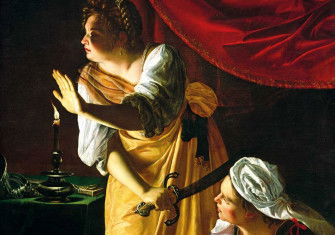Susanna and the Elders
An innocent woman resists two sexual predators, only to face a trial that reveals their guilt.

Demonstrating brilliant technique and interpretative insight, Artemisia Gentileschi was just 17 when she first painted on a theme she would return to repeatedly. The biblical Apocrypha recounts the tale of Susanna, the beautiful wife of Joachim. She is bathing in their garden when she is surprised by two elders. The men threaten her with sexual violence and tell her that they will both accuse her of adultery if she does not submit to them. She resists and they carry out their threat.
Susanna is brought to trial for the capital offence of adultery. She pleads her innocence, which is finally ascertained when the young Daniel interrogates the accusers separately. Their accounts differ wildly, are wholly contradictory and, as a result, Susanna walks free, virtue intact.







